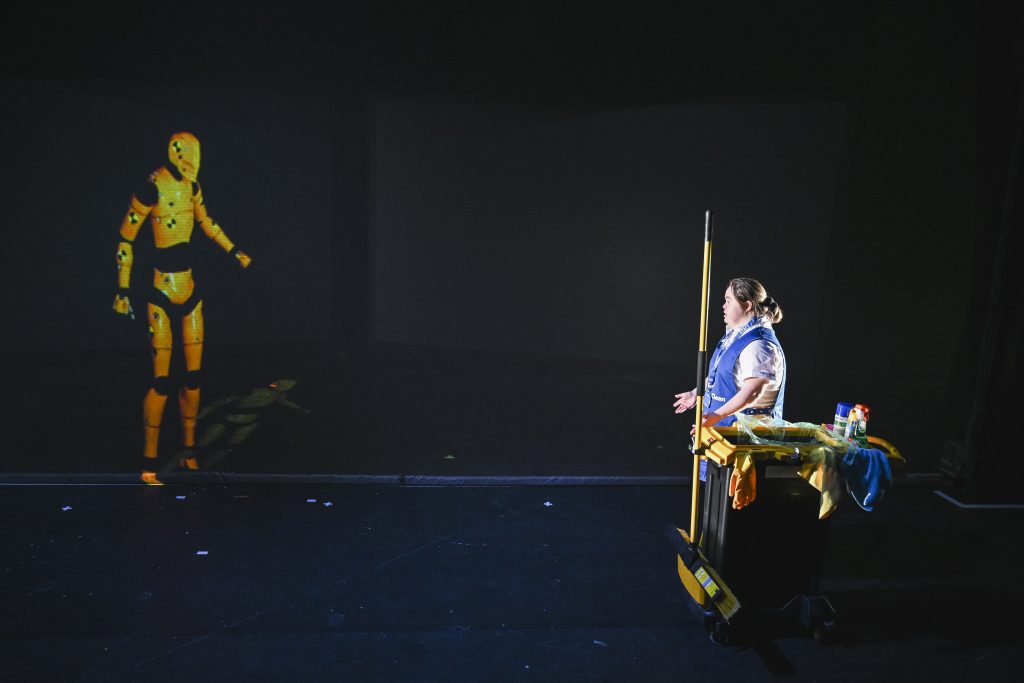Marine Furet reviews the_crash.test, a new production about technology and identity due to perform as part of Hijinx’s Unity Festival.
Hot take: sometimes, too much technology can get in the way of a good critique of technology.
Admittedly, hot takes are just that – hot takes – but recent experience threatens to turn me into a more conservative audience member than I wish I would be.
I would have loved to love the_crash.test, a new production from inclusive theatre company Hijinx fresh off its first run at the Wales Millennium Centre. Directed by Ben Pettitt-Wade, the play can be watched in person and online, and is the result of a partnership with the WMC, Pontio and Theatr Ffwrnes. On paper, its experimental and funky approach to technology and audience participation had much to offer. In practice, the production’s enthusiasm gets bogged down in poor execution. While the play certainly gives us a lot to chew on, this ambitious new show, dubbed a ‘Frankenstein tale for our age’, does not really come together into a cohesive whole. It would be facile to insert a comparison with Mary Shelley’s creature here –and in fairness the play is well attuned to some of the spirit of the 19th century masterpiece, at least thematically.
The show stages a theatre company’s attempt at directing an innovative new play, centred around a tech company modelled after the likes of Tesla and the recently relabelled augmented reality firm Meta. The company’s flagship product is a digital motion capture puppet intended to live on behalf of its owner, Thing-a-me Bob, or Bob. Bob is able to become whichever cast member animates it, in a fun feat of technology that must have been the basis for much rehearsal silliness.
Of course, chaos ensues: Bob becomes increasingly sentient, and resents his condition as a dummy susceptible to being indefinitely erased and updated, but his well-meaning attempts at helping his human counterparts go terribly awry; and one cast member grows uncomfortable at the company’s lack of respect for his personal boundaries when he finds his life turned into a plot device. Technology, creation, identity: these are big, inexhaustible subjects, no doubt. However, the play’s surface-level exploration of all three and the cacophonic insertion of technology end up cluttering rather than serving an otherwise seductive premise.
Tic Ashfield’s soundtrack makes a noticeable contribution to the play’s atmosphere, giving tense scenes more emotional depth and momentum.
We do not get to know much about the characters themselves. Figital, the fictional company at the centre of the play, consists of a parodic CEO and investors appearing on Zoom, and an engineer tasked with looking after Bob. Their meetings evince a vague sense that we are watching a panto, but without the kitsch excess, pizazz, and ‘He’s behind you’ jokes, which I would otherwise have gotten behind as a concept. One risqué joke involving plastic balls and ‘Thing-a-me-Bob’ comes close to that spirit, but even that can only last so long.
Many of the protagonists remain fairly obscure and two-dimensional all the way to the end. There are a few happy exceptions: Bethany Freeman plays her character Betty, a cleaner left to deal with the results of the company’s chaotic management, with a sense of humour that makes her one of the show’s most lovable protagonists. As an engineer turned AI-sitter and actor brought close to a nervous breakdown, Owen Pugh is a key emotional entry-point for the audience, his despair, frustration, and empathy making him relatable and accessible amid a sometimes hard to follow plot line. Tic Ashfield’s soundtrack makes a noticeable contribution to the play’s atmosphere, giving tense scenes more emotional depth and momentum. Given the play’s ambition to explore questions of identity, however, there is regrettably little in the way of character development for quite a few other protagonists and secondary characters, who only appear episodically.
My other gripe is with the use of technology in the show. Bob, the motion-animated puppet, is a great implement: I only wish he was given more room to shine. Instead, he is often set against unflattering video backgrounds that lessen rather than enhance his exploration of his sense of self and other props that seem uneasily tacked on to the plot rather than help it. His changes of voice, for example, feel slightly random rather than made to be a part of the play, and could have been exploited in greater depth.
Innovative. Informed. Independent.
Your support can help us make Wales better.
Audience participation comes in the shape of polls at the beginning and end of the show, but doesn’t feel integrated into the performance very well: what exactly is the role of the audience? Are we investors? Actors? The show’s references to the internet and to a deeper, elusive ‘network’ are vague and fuzzy, and I occasionally felt like I was watching a more chaotic version of Black Mirror, complete with all of the series’ relentless techno-pessimism, but minus the sleek aesthetics and massive Netflix budget. AI is a complex topic: I wish I’d left the play feeling more provoked than puzzled, and more engaged than bored.
It can be hard to explain one’s likes and dislikes and there is no need to labour the point: this play wasn’t for me. The production is in its very early days and those elements of the plot that still feel jarring may well be tweaked in the future. The_crash.test had a two-day run at the WMC, but is due to tour at the Mittenmang Festival in Germany and then as part of Hijinx’s Unity Festival, and I can only wish it all the best. I just didn’t enjoy being the subject of that particular crash test.
Audiences can see the_crash.test as part of Hijinx’s Unity Festival, at WMC on 24 June, Pontio (Bangor) on 29 June, and Ffwrnes (Llanelli) on 2 July.
All articles published on the welsh agenda are subject to IWA’s disclaimer.




